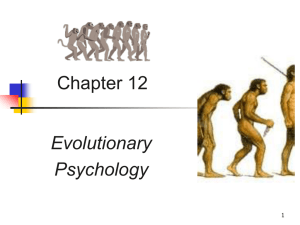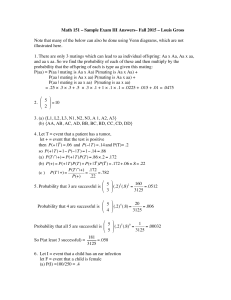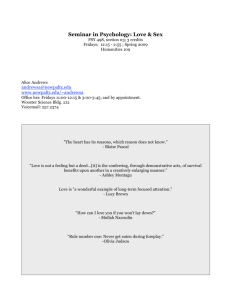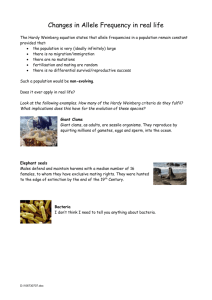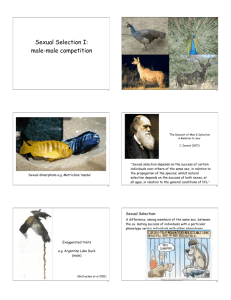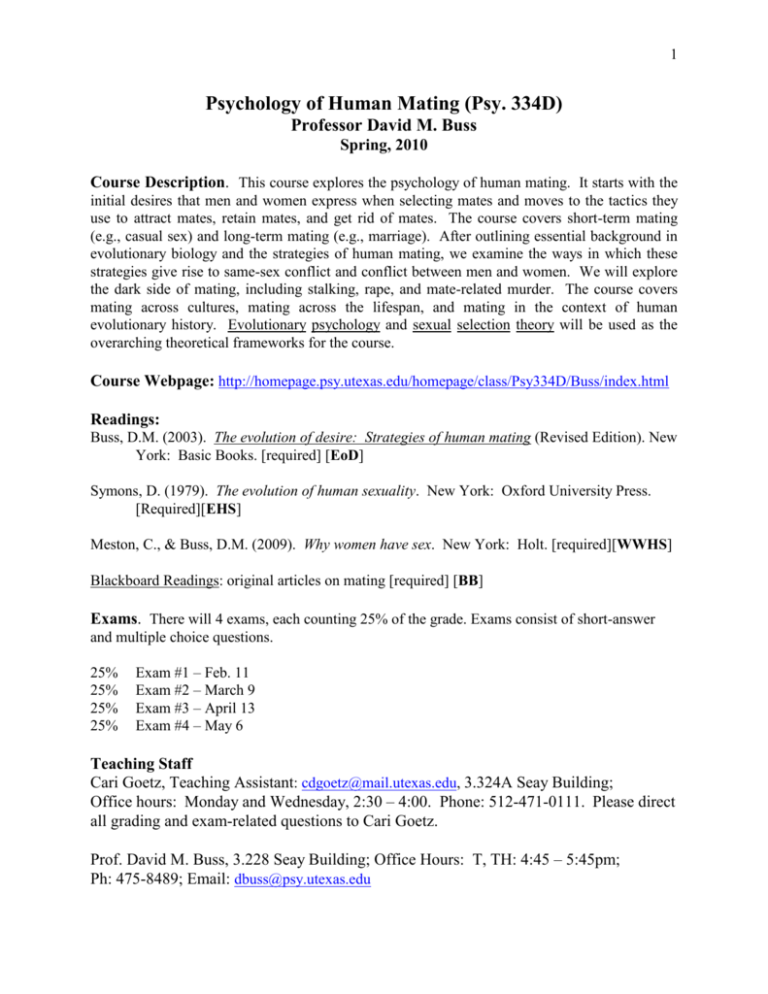
1
Psychology of Human Mating (Psy. 334D)
Professor David M. Buss
Spring, 2010
Course Description. This course explores the psychology of human mating. It starts with the
initial desires that men and women express when selecting mates and moves to the tactics they
use to attract mates, retain mates, and get rid of mates. The course covers short-term mating
(e.g., casual sex) and long-term mating (e.g., marriage). After outlining essential background in
evolutionary biology and the strategies of human mating, we examine the ways in which these
strategies give rise to same-sex conflict and conflict between men and women. We will explore
the dark side of mating, including stalking, rape, and mate-related murder. The course covers
mating across cultures, mating across the lifespan, and mating in the context of human
evolutionary history. Evolutionary psychology and sexual selection theory will be used as the
overarching theoretical frameworks for the course.
Course Webpage: http://homepage.psy.utexas.edu/homepage/class/Psy334D/Buss/index.html
Readings:
Buss, D.M. (2003). The evolution of desire: Strategies of human mating (Revised Edition). New
York: Basic Books. [required] [EoD]
Symons, D. (1979). The evolution of human sexuality. New York: Oxford University Press.
[Required][EHS]
Meston, C., & Buss, D.M. (2009). Why women have sex. New York: Holt. [required][WWHS]
Blackboard Readings: original articles on mating [required] [BB]
Exams. There will 4 exams, each counting 25% of the grade. Exams consist of short-answer
and multiple choice questions.
25%
25%
25%
25%
Exam #1 – Feb. 11
Exam #2 – March 9
Exam #3 – April 13
Exam #4 – May 6
Teaching Staff
Cari Goetz, Teaching Assistant: cdgoetz@mail.utexas.edu, 3.324A Seay Building;
Office hours: Monday and Wednesday, 2:30 – 4:00. Phone: 512-471-0111. Please direct
all grading and exam-related questions to Cari Goetz.
Prof. David M. Buss, 3.228 Seay Building; Office Hours: T, TH: 4:45 – 5:45pm;
Ph: 475-8489; Email: dbuss@psy.utexas.edu
2
Psychology of Human Mating
Dates
Topic
Readings
Jan. 19
Introduction
EoD: chap. 1; WWHS: Introduction
Jan. 21, 26
Evolution & Selection
BB #1, 2; EHS: 1, 2
Jan. 28, Feb. 2
Women's LT Desires
EoD: 2; EHS: pp. 96-127
Feb. 4, 9
Men's LT Desires
EoD: 3; EHS: Chap. 6
Feb. 11
Exam #1
No Readings
Feb. 16, 18
Casual Sex
EoD: 4; EHS: Chap. 7; WWHS 7, 8
Feb. 23
Female Orgasm
EoD: 221-240; EHS: Chap. 3; WWHS 2
Feb.25
Rhythms of Ovulation
EoD: 240-249; EHS: 127-141
March 2, 4
Attracting a Partner
EoD: 5; EHS: Chap. 5; WWHS: 4
March 9
Exam #2
No Readings
March 11
Sexual Attractiveness
WWHS: chap. 1
March 16, 18 -- Spring Break: No Classes or Readings
March 23
Mate Retention
EoD: 6; WWHS: 5; BB #3
March 25
Mate Stalking
BB #4
March 30
Mating and Murder
BB #5
April 1, 6
Conflict Between Sexes
EoD: 7; WWHS; chap 10
April 8
Rape
EoD: 270-285; EHS: 8; BB 6, 7
April 13
Exam #3
No Readings
April 15, 20
Breaking Up
EoD: 8; BB #8, 9
April 22
Lifespan Mating
EoD: 9; BB #10
April 27
Mysteries of Mating
EoD: 12; BB #11, 12
April 29
Love & Mating Harmony EoD: 10; BB #13; WWHS 3
May 4
Mating Intelligence
BB #14; WWHS: 11
May 6
Exam #4
No Readings
3
Psychology of Human Mating
Psychology 334D
Professor David M. Buss
Drop Policy:
The Psychology Department will drop all students who do not meet the following prerequisites:
PSY 301 with a C or better; PSY 418 (or an equivalent listed in the course schedule) with a C or
better; and upper-division standing (60 hours completed).
Disabilities Statement:
The University of Texas at Austin provides upon request appropriate academic accommodations
for qualified students with disabilities. For more information, contact the Office of the Dean of
Students at 471-6259, 471-4641 TTY.
Blackboard Readings
#1
Buss, D.M., Haselton, M.G., Shackelford, T.K., Bleske, A., & Wakefield, J.C. (1998).
Adaptations, exaptations, and spandrels. American Psychologist, 53, 533-548.
#2
Barker, L. (2006). Teaching evolutionary psychology: An interview with David M. Buss.
Teaching of Psychology, 33, 69-76.
#3
Buss, D.M. (2002). Human mate guarding. Neuroendocrinology Letters, 23, 23-29.
#4
Spitzberg, B.H., & Cupach, W.R. (2003). What mad pursuit? Obsessive relational
intrusion and stalking related phenomena. Aggression and Violent Behavior, 8, 345-375.
[plus read www.stalkinghelp.org web site]
#5
Duntley, J.D., & Buss, D.M. (2004). The evolution of evil. In A. Miller (Ed.), The social
psychology of good and evil. New York: Guilford.
#6
Thornhill, R., & Palmer, C. (2000). Why men rape. The Sciences.
#7
Archer, J., & Vaughn, A.E. (2001). Evolutionary theories of rape. Psychology,
Evolution, and Gender, 3, 95-101.
#8
Betzig, L. (1989). Causes of conjugal dissolution. Current Anthropology, 30, 654-676.
#9
South, S.J., Trent, K., & Shen, Y. (2001). Changing partners: Toward a macrostructuralopportunity theory of marital dissolution. Journal of Marriage and the Family, 63, 743754.
4
#10
Treas, J., & Giesen, D. (2000). Sexual infidelity among married and cohabiting
Americans. Journal of Marriage and the Family, 62, 48-60.
#11
Muscarella, F. et al., (2001). Homosexual orientation in males. Neuroendocrinology
Letters, 22, 393-400.
#12
Singh, D., Vidaurri, M., Zambarano, R. J. & Dabbs, J. M. (1999). Lesbian Erotic Role
Identification: Behavioral, Morphological, and Hormonal Correlates. Journal of
Personality and Social Psychology, 76, 1035-1049.
#13
Buss, D.M. (2006). The evolution of love. In R.J. Sternberg & Karin Weis (Eds.), The new
psychology of love (pp.65 – 86). New Haven, CT: Yale University Press.
#14
Buss, D.M. (2007). The future of mating intelligence. In G. Geher & G. Miller (Eds.),
Mating intelligence. Mahwah, NJ: Erlbaum.

